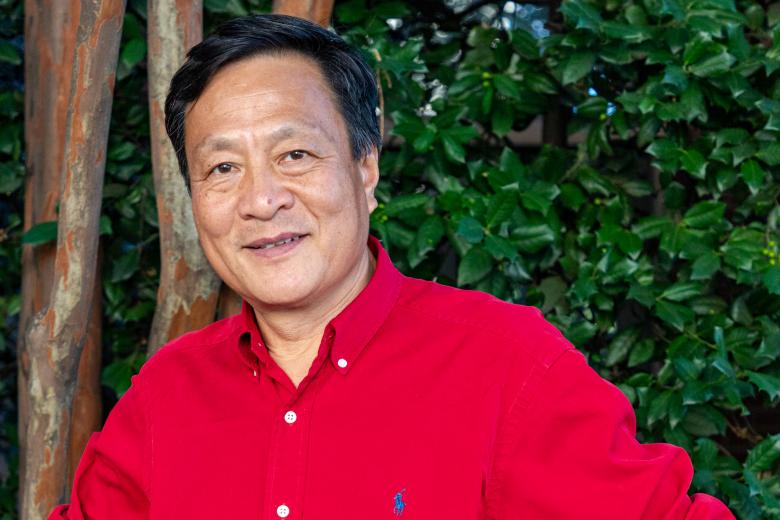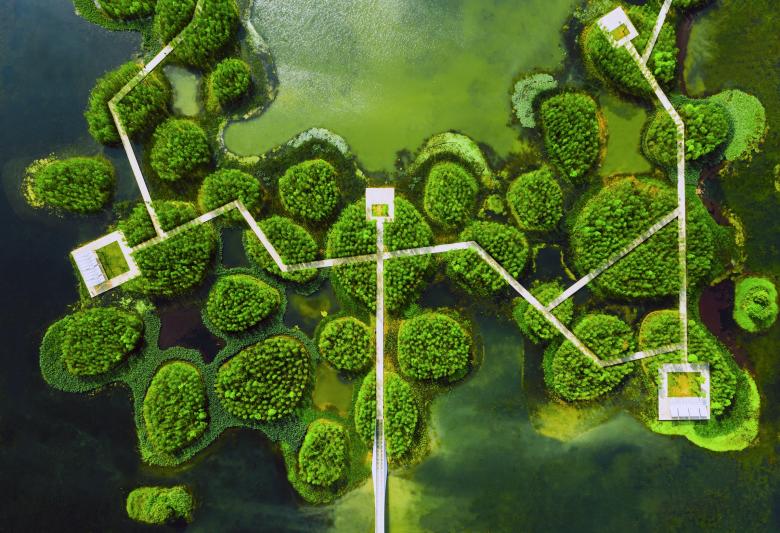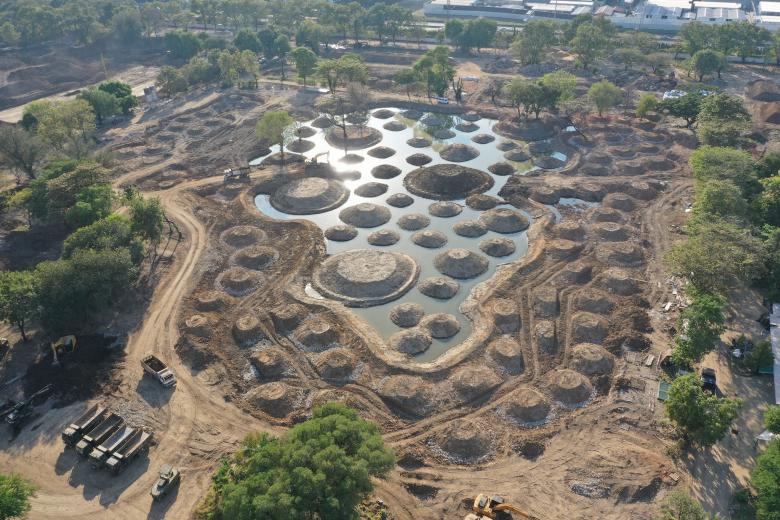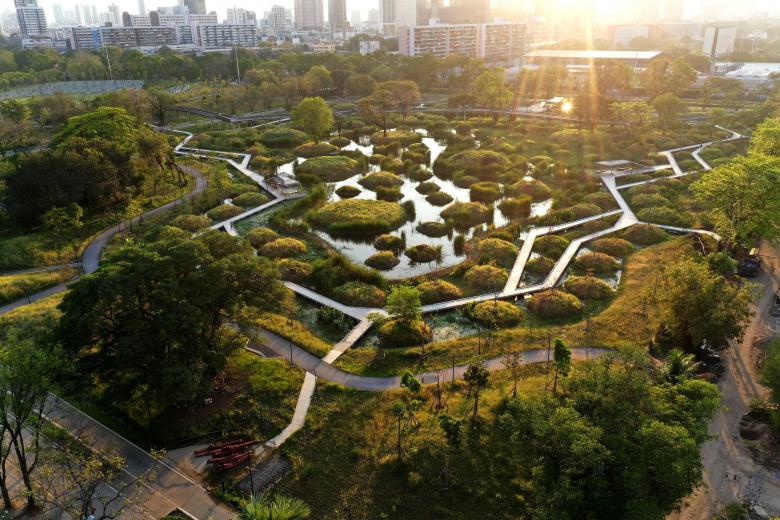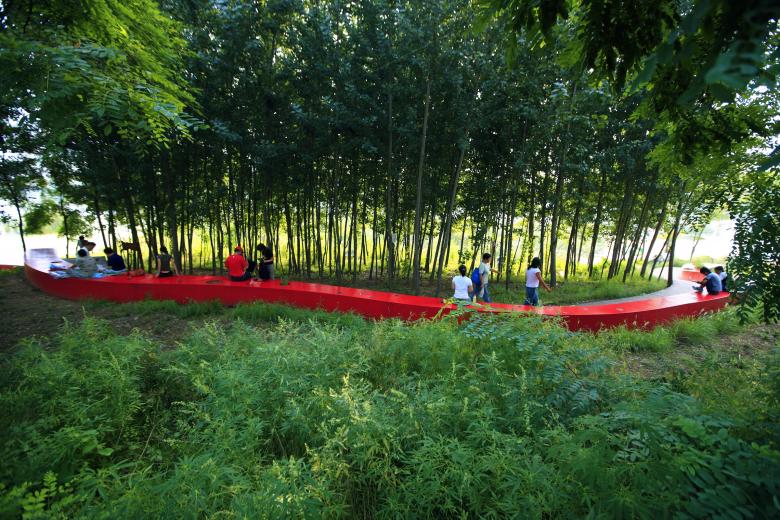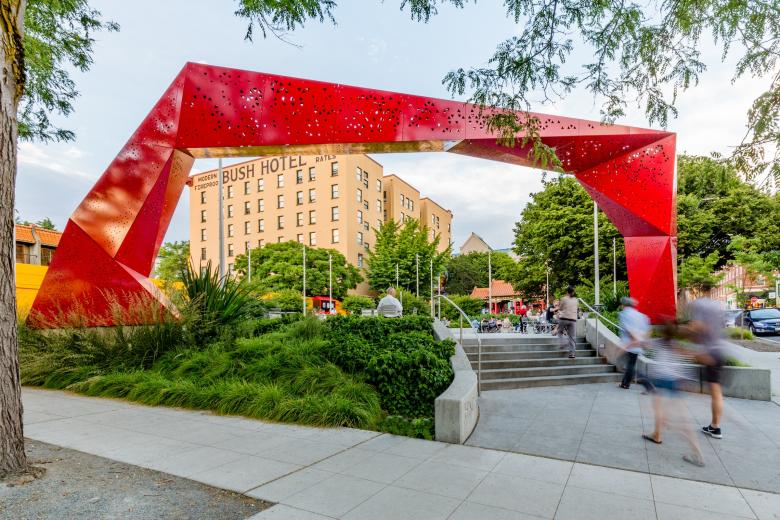2023 Oberlander Prize to Kongjian Yu
John Hill
17. oktober 2023
2023 Oberlander Prize Laureate Kongjian Yu, 2023 (Photo © Barrett Doherty, courtesy of The Cultural Landsape Foundation)
Chinese landscape architect Kongjian Yu is the winner of the 2023 Cornelia Hahn Oberlander International Landscape Architecture Prize, the biennial $100,000 award organized by The Cultural Landscape Foundation (TCLF).
Today's announcement from TCLF describes Kongjian Yu, founder and principal designer at Turenscape, as “the global champion of the ‘sponge cities’ concept for addressing climate change-accelerated urban flooding.” Instead of dams, pipes, drains, and other common engineered solutions, Yu's sponge-city infrastructures incorporate constructed wetlands, greenways, rain gardens, permeable pavements, bioswales, and other nature-based features. The concept, which was adopted as Chinese national policy in 2013, is most recognizable in Turenscape's numerous large-scale ecological landscapes often positioned alongside existing waterways and surrounded by tall buildings. There is an undeniable beauty to Yu's landscapes — both from the air and at ground level.
Nanchang Fish Tail Park, Nanchang,Jiangxi Province, China, 2021 (Photo © Turenscape, courtesy of The Cultural Landscape Foundation)
In a recent interview conducted by TCLF (embedded at the bottom of this post), Yu says “the destruction of my own paradise is what [made] me think that we need a revolution,” referring to the concrete dams, culverts, and other engineered infrastructure built throughout China in the 1980s. His revolution, which eventually took the form of sponge cities, was also born from the irresponsible and damaging use of DDT in China following on the heels of US President Richard Nixon's visit in 1972 and a personal incident not long after: falling into a creek and nearly drowning, Yu held on the low-hanging branch of a willow tree, its limbs and other vegetation slowing the current. Likewise, Yu's designed ecologies — the phrase is also the name of a 2012 monograph on the landscape architect — tend to slow down water without disrupting natural processes, while also making productive use of the water. In fact, a number of the hundreds of parks Yu has designed, most of them in China, feature productive landscapes like rice paddies.
Benjakitti Forest Park under construction, Bangkok, Thailand, 2021 Photo ©Turenscape courtesy The Cultural Landscape Foundation)
The success of Yu and Turenscape's “revolution” is evident, not only in China's adoption of the sponge-city concept a decade ago, but in Yu's ability to convince mayors and other local politicians to remove old engineered landscapes and industries in favor of nature-based solutions. A case in point is the ten-mile-long Puyangjiang River Corridor in East China. The project description reads, in part:
“The river was largely channeled with concrete and hard surfaces, and has lost its resiliency to water and lost its capacity for self-cleansing. The design removes the concrete of the river bank, recovers the riparian plains on both sides of the river and turns them into Green Sponges, which are designed to be flood adaptive, able to catch and remediate the surface flows from the agricultural fields and build areas biologically. Ecological buffers are designed so that the river water can be diverted, slowed down and cleansed.
[…]
As a result, in just three years, the mother river was cleansed and people come to swim and bathe in the river as they did when they were kids decades ago. The concrete river bank has largely been softened and native vegetation recovered, with frogs and birds coming back and making their homes here again. Continuous pedestrian and bike paths allow the newly urbanized residents to jog and ride in the morning and evening or have a leisure weekend family gathering. The beauty and dignity of the mother river has been restored, in addition to a modern and fresh face featured with contemporary landscape design, and has attracted tens of thousands of visitors every day.”
Benjakitti Forest Park, Bangkok, Thailand, 2022 (Photo © Turenscape, courtesy of The Cultural Landscape Foundation)
Similar approaches are found in other projects, something that makes Turenscape's landscapes distinctly theirs. Some of the most notable design features are found in the colorful pathways and pavilions that punctuate the green, blue, and brown landscapes. Although far from his first park, it seems wider attention first came to Yu with the aptly named Red Ribbon Park, located along the Tanghe River on the urban fringe of Qinhuangdao City in China's Hebei Province. Sponge-city landscapes span both sides of the river, but on the east side is a 500-meter-long “red ribbon” used for lighting, seating, environmental interpretation, and orientation.
Red Ribbon Park, Qinhuangdao, Hebei Province, China, 2008 (Photo © Turenscape, courtesy of The Cultural Landscape Foundation)
Red Ribbon Park was completed in 2008, but numerous projects before and since have also used design features in bold red colors to complement the landscapes but also create a sense of place within their contexts, be it a large “sponge city,” a small urban park, or a botanic garden. Other Turenscape-red projects include Zhongshan Shipyard Park (2002) in Zhongshan, Boston Chinatown Park (2005), and Hing Hay Park (2018) in Seattle.
Kongjian Yu is the second recipient of TCLF's Cornelia Hahn Oberlander International Landscape Architecture Prize, coming two years after Julie Bargmann, founder of D.I.R.T. (Dump It Right There) studio, won the inaugural prize. In addition to $100,000, the prize consists of “two years of public engagement activities focused on the laureate’s work and landscape architecture more broadly.”
Hing Hay Park, Seattle, WA, 2018 (Photo © Miranda Estes, courtesy of Turenscape and The Cultural Landscape Foundation)
The seven-member jury for the 2023 Oberlander Prize:- Professor Elizabeth Mossop (chair), Dean of the University of Technology Sydney (UTS) School of Design, Architecture and Building
- Christian Benimana, Co-Executive Director and Senior Principal, MASS Design Group, Kigali, Rwanda
- Consuelo Bravo, owner of Panorama in Santiago, Chile
- Adriaan Geuze, founder of West 8 urban design & landscape architecture, Rotterdam, The Netherlands
- Leonard Ng Keok Poh, Ramboll Studio, Singapore
- Kotchakorn Voraakhom, CEO and Founder of Landprocess and Porous City Network, Bankgok
- Jane Wolff, professor at the University of Toronto’s Daniels Faculty of Architecture, Landscape, and Design
- Oberlander Prize Curator is John Beardsley
